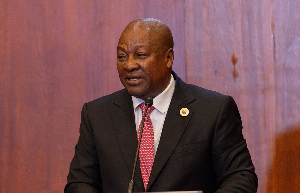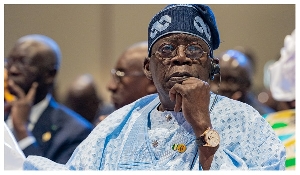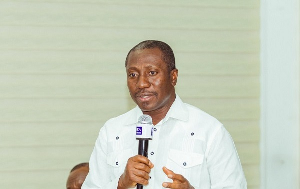The whole country has been gripped by a titanic face-off between the Bawumia camp and the IMANI camp this week about credit scoring in Ghana.
Alhaji Dr. Bawumia is the Vice President of Ghana who is hoping to succeed his boss next year. In his corner is his Technical Advisor and Spokesman Dr. Gideon Boako, an Economist, and another Economist, Dr. Theo Acheampong, a petroleum expert and Political Risk Analyst.
IMANI is one of Ghana’s most influential and vocal think tanks. In their camp is President Franklin Cudjoe, a Land Economist and renowned Policy Analyst. IMANI’s camp also has its Vice President Bright Simons, a global ICT innovator and Policy Analyst.
The battle started when Bawumia gave a speech at KNUST in Kumasi about credit scoring in Ghana (link: https://www.graphic.com.gh/news/general-news/video-ghana-card-to-anchor-individualized-credit-scoring-system-bawumia.html). This is what Bawumia said to spark off the battle:
“I am also happy to note, Your Majesty, that Ghana early next year will be introducing a credit scoring system for individuals. That credit scoring system, every individual will have a credit score. Right now, our credit scoring system does not exist. So, everybody is seen as risky and the interest rates are high. But we are going to move into individualised credit scoring. So, if you don’t pay your loan you will have low credit score…the Ghana Card will also become the anchor for a credit system in Ghana.”
Bright Simons pushed back by pointing to the Bank of Ghana’s annual credit referencing reports for 2019 and 2022 on Twitter. He insisted that individuals are tracked by existing credit referencing bureaus so Bawumia cannot say that all Ghanaians are seen as risky in the same way and that this will only change from early next year when Bawumia introduces his Ghana Card–based system.
It is a fact that the credit referencing system shows that loan defaults are already tracked individually in Ghana so the statement that everyone is seen as risky flies in the face of the facts. Before a loan is given out by a financial institution in Ghana the law (LI 2394) requires the Bank or lender to check the individual loan applicant’s credit file at the credit reference bureau. If the system wasn’t individualised this wouldn’t be possible.
Gideon Boako then entered the ring on Twitter to take on Bright Simons. He said that only 20% of adults in Ghana have been captured by the credit referencing system and that the system is bank-led and elitist. What the Ghana Card will offer is a system whereby everyone can go online and check.
Theo Acheampong agreed with Bawumia that the current credit referencing system leaves a lot to be desired because the data is aggregated and not in the form of an individualised score.
This led Bright Simons to write a detailed essay (link: https://brightsimons.com/2023/11/30/does-ghana-have-a-credit-scoring-system/) showing that the credit referencing bureaus market credit scoring services on their websites. One of them, XDS, says that it provides a score for each individual between 300 and 850.
Franklin backed Bright on Facebook and, like Bright, reminded everyone that the form used to submit credit data on individuals to the credit reference bureaus has 178 data fields, which include Ghana Card, EZwich, SSNIT and far more pieces of information than the roughly 20 fields in the Ghana Card registration forms.
The current problem, according to Bright, with the current credit referencing system is that some companies that are supposed to be submitting data on people refuse to do so. Companies like ECG, Ghana Water, the telecom companies and retailers (like car dealerships that offer hire-purchase and drive and pay services) do not always comply with the law and regulations. In his view, Ghana Card has nothing to do with why the system isn’t comprehensive enough even though it covers nearly 9 million adults (which is about 50% of all adults in Ghana, not the 20% Gideon claimed). He also argues that many private companies are already using the existing credit referencing system and improving it.
Theo said he will issue a rejoinder if his claims were proven wrong but he has yet to respond clearly to the rebuttals made by IMANI, which, strangely, he is a senior fellow of.
Anyway, the main contention in this battle is whether or not individuals in Ghana have credit scores.
As far as that debate is concerned, the evidence is overwhelming that there is a level and kind of credit scoring in Ghana. The Bank of Ghana 2022 credit referencing report does state that the government is planning to introduce a credit scoring system to complement the credit report based on the Ghana card. This is merely stating what Bawumia has said repeatedly since 2022 (link: https://www.peacefmonline.com/pages/local/news/202207/470855.php).
That cannot mean that credit scoring doesn’t exist already. Actually, IMANI’s beef with Bawumia is that the government is using the Ghana Card as a ruse to elbow the private systems in place when it can’t add any real value.
IMANI’s contention that credit scoring exists in addition to credit reporting is backed by a lot of evidence.
A press statement on the website (link: https://www.dnbcb.com/press_releases.html#) of one of the credit reference bureaus called Dun & Bradstreet titled “Financial institutions, credit bureaus and you” captures an interview given as far back as 2015 by the current Head of Data Management and Operations, Gabriel Ofori Yeboah. In the interview Gabriel Yeboah said:
“The primary factors used to calculate an individual’s credit score are his/her credit payment history, current debts, time length of credit history, credit type mix and frequency of applications for new credit. Because the scoring systems are based on different criteria which are weighted differently, the three major credit bureaus in Ghana – Dun & Bradstreet Credit Bureau Ltd., HudsonPrice Data Solutions Limited and XDSData Ghana Limited, all licensed by the Bank of Ghana – may issue differing scores based on the same credit report information.”
This interview was also captured on Assase Radio’s website (link:
https://www.asaaseradio.com/financial-institutions-credit-bureaus-and-you/)
Many commercial organizations in Ghana clearly operate with these credit scores (and not just reports). Devtraco, a real estate company, even provides guidance to its customers in Ghana about the importance of credit scores (link: https://devtraco.com/credit-score-in-ghana/)
In page 2 of Fidelity Bank’s smart-loan application terms and conditions factsheet, the bank mentions its use of credit scores (link: https://www.fidelitybank.com.gh/faqs/135-smart-loan-terms-and-conditions/file).
Section 18.2 of the terms and conditions of Stanbic Bank Ghana’s Credit Card Application Form requires the applicant to consent to the credit reference bureau releasing the credit score to other credit providers. (link: https://www.stanbicbank.com.gh/static_file/ghana/Downloadable%20Files/Credit%20Card%20Terms%20and%20Conditions.pdf) .
Section 4.9 of the terms and conditions of MTN Ghana’s Pay-As-You-Go service which most Ghanaians use also informs the user that the credit score may be demanded as a requirement to use the service (link: https://mtn.com.gh/terms-and-conditions-of-service-pay-as-you-go/).
Dalex Finance offers the Swift service (link: https://www.dalexswift.com/terms-and-conditions-swift-daily/#).
One of the first conditions is the following:
“SWIFT Advance is an all-digital loan scheme which offers members access to instant funds against an established Credit score.”
There really is no doubt left anymore that in this titanic debate, the IMANI position is the stronger one. Kudos to all the contenders for opening the eyes of many more Ghanaians to the nature and purpose of credit scores, credit referencing bureaus and credit reports.
KOD
Business News of Sunday, 3 December 2023
Source: www.ghanaweb.com













